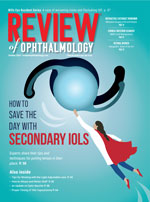Personality conflicts in the workplace exist everywhere and routinely affect even your best employees. During my career as an ophthalmic administrator, I have developed an interest in getting to the root of these personality differences. In this article, I will explain how these personalities affect learning styles, communications, perceptions and job performance and what the administrator can do to help staff understand each other.
Personality and Work Style

I may be pointing out the obvious when I propose that most technicians and front office personnel have different personalities that correlate with their skills, create their work style and make them a good fit for their particular function within the organization. While these personalities can be very different, all employees are primarily extroverts (outgoing) or introverts (quiet and reserved).
These two personality groups can further be divided to create four generalized personality mixes: director, influencer, analytical or expressive.
• Director personalities are natural leaders. They are extroverts, quick thinkers and action-oriented people. These individuals are irritated by indecision, loss of control and tend to unknowingly or unconsciously dictate under stress.
• Analytical personalities are also thinkers. They tend to take longer to make decisions. They are compliant, conservative and like a systematic approach to everything. These individuals do not like to be embarrassed. Therefore, they tend to withdraw in tough situations and are frequently irritated by spur of the moment events. Analyticals thrive upon accuracy and deliberate processes. Routinely, you will find their workspaces to be very organized, neat and tidy.
• Influencing personalities tend to use influence and are extroverts by nature. These individuals are very expressive and creative. They are trendy, spontaneous and seek recognition, but are easily irritated by structure. They are anything but deliberate when making decisions. Their work area tends to be cluttered, as they are more interested in communicating with people than personal belongings.
• Expressive personalities also value communication, but are more introverted and avoid confrontations. They tend to nurture relationships, conform to their surroundings and their office space is very personal. However, they can easily be irritated by impatience or if they are rushed to complete tasks.
Personalities in Practice
The first step in understanding these personality types involves the comprehension that every person is a mix of these diverse personalities. They usually have distinct habits, or attributes, that help to identify the stronger traits in each individual.
For example, there is usually a much higher level of analytical traits in technicians. They will pay attention to detail and be thorough during examinations. Likewise, good receptionists should have some influence and expressive qualities to relate well with patients. Receptionists are most likely extroverts and their interest in the well-being of others will aid them in performing the particulars of their job.
Where Breakdown Occurs
I've learned, however, that simply placing all extroverts at the front desk doesn't work. Remember, there are two groups of extroverts, directors and influencers, and this is most commonly where problems occur. The director personality may seek a systematic approach to everything at the front desk, while the influencer personality is frequently irritated by such behavior. Unfortunately, you have two forces working in a single location. If these two personalities are aware of their differences and learn to communicate openly and honestly, they will make a great work team by capitalizing on combined strengths. If they do not, disaster can strike, leading to conflict, inefficiency and confusion.
While mainly analytical, technicians, too, may fall into all personality mixes. One technician likes structure, while others may pride themselves on being creative, or spontaneous. Communications are very different among these groups. Director personalities tend to cut to the chase and are irritated by all the minute details, whereas analytical personalities must get all the details and will spend a great amount of time getting every last detail right.
Defusing the Time Bomb
The only way to successfully alleviate this problem is to encourage employee education. First, the staff must understand who they are and what makes them tick. By learning more about themselves and their fellow employees, people can extinguish the sparks that might cause damage to relationships. This is a key process in creating an efficient team-oriented workplace. Encourage employees to learn about themselves and others in an effort to promote effective communication throughout the office.
Of course, the occasional flare up will occur, for interpersonal conflicts will never totally disappear. Training employees equips them to handle situations amicably and helps them establish respect for others' differences. Applying this principle to our earlier scenario of conflicting personalities at the reception desk, we learn that each can alter her communication style to make the other person more comfortable. They can work together on projects by taking on the parts of the task that best fit each personality.
| Personality Testing |
| These are just a few online sources for personality tests and consulting services: Keirsey.com — Defines and discusses the four temperaments as sorted by the Keirsey Temperament Sorter II Personality Instrument. Humanmetrics.com — Offers several online tests, including the Jung Typology Test. Similarminds.com — Links to a variety of online and and paper personality tests, including a link to the publisher of the Myers-Briggs Type Indicator assessment. |
Personality Testing
I recommend including a personality test activity at your next staff retreat. Most of the tests available are easy, fun and extremely educational for both you and your staff. You can easily find credible tests on the Internet or obtain copies by mail order through Myers-Briggs, Colorgenics, Keirsey or a local consultant (See sidebar "Personality Testing"). You might prefer to hire an outside person to present this information—a good choice if communication in your organization is currently tense and tempers could flare easily. It's important that as a manager you do something rather than let a personality-based problem persist or continue to grow before striving to repair the lines of communication. Educating your employees can empower them and provide them with the knowledge and understanding they need to deal with both their daily office life and personal relationships. In a team-oriented, professional, patient-friendly practice, staff members accept who they are and understand that all personality types can work together for the success of the entire organization.
Ms. Curd is the practice administrator at Shelby Eye Centers PA. Contact her at eyecurd@msn.com.



